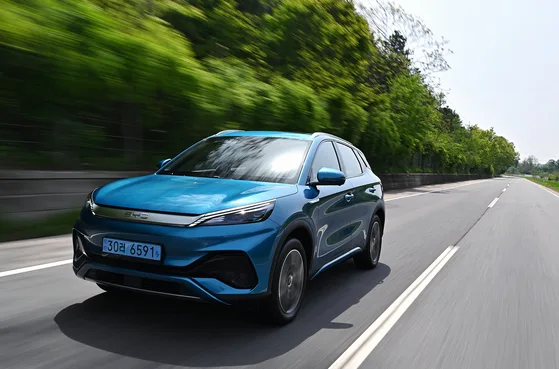![BYD’s Atto 3, which recently hit the Korean market [BYD]](https://koreajoongangdaily.joins.com/data/photo/2025/10/28/55de9d2a-4ae1-47ef-8cfe-5192f89f7401.jpg)
BYD’s Atto 3, which recently hit the Korean market [BYD]
BYD has rode the momentum of its debut in the Korean market, breaking down long-held consumer biases toward “Made in China” while bringing a new wave a change among imported autos, rapidly expanding its market share as the local market faces a changing landscape in the automotive sector.
The carmaker’s successful entry into the Korean market is attributed to a range of factors, from competitive pricing to its innovative technology.
BYD’s pricing goes against the grain among EV makers, with prices continually rising. The Chinese EV maker, on the other hand, has reduced the financial burden and entry barrier for prospective buyers, with its Atto 3 SUV, the Seal midsize sedan and the Sea Lion 7 midsize SUV offering some of the most affordable prices for EVs in their classes.
That competitiveness extends to the brand’s innovations, such as its self-developed Blade Battery, considered a core technology that underpins the company’s growth. The design of the battery put a focus on safety, durability and efficiency, serving to ease consumer concerns about EV battery safety.
The lithium iron phosphate-based Blade incorporates an innovative design that reduces the risk of internal short-circuiting and thermal runaway, safe from fire or explosion even if it is pierced by a sharp object, heated to 300 degrees Celsius (572 degrees Fahrenheit) or run over by a 46-ton truck. BYD’s vertical integration — producing and installing the batteries in-house — demonstrates a high level of technological refinement.
BYD’s growth is considered a symbolic example of changing perceptions among Korean consumers. In the past, brand image and emotional appeal played a major role in purchasing decisions. Now, technological prowess, product quality and price rationality are prioritized, reflecting a practical, utilitarian approach to consumption that is becoming increasingly widespread.
Industry insiders note that BYD is prioritizing long-term trust over short-term sales. Its aggressive expansion of test drive programs and the establishment of a localized service network are helping to lower the psychological barrier associated with “Made in China.” By allowing consumers to directly experience the vehicles, BYD continues to instill confidence in the performance and quality of its products, a move that has been likened to as a distinctive and strategic approach.
BYD’s growth does not simply signify the entry of a new foreign brand or its targeting of the Korean market. Rather, it is a reflection of domestic consumers shift to more rational purchasing choices as the criteria for selecting a vehicle evolves from its country of origin to its overall competitiveness.
BY JANG HAYOON [[email protected]]








